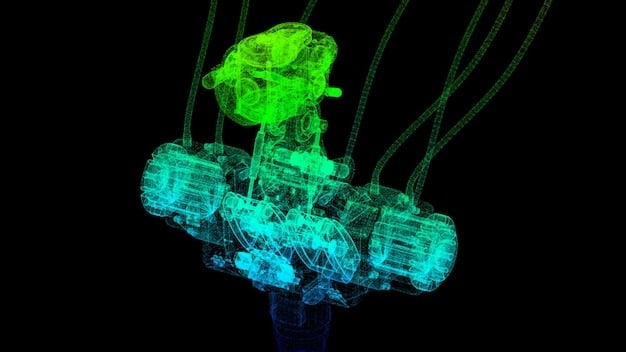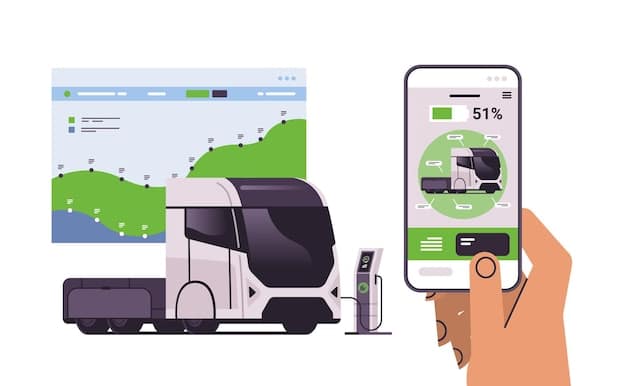The Role of Machine Learning in Electric Vehicle Battery Optimization

Machine learning plays a crucial role in optimizing electric vehicle (EV) battery performance by enhancing energy management, predicting battery health, and improving charging efficiency.
Electric vehicles (EVs) are revolutionizing the automotive industry, and at the heart of their performance lies the battery. Optimizing EV battery performance is critical for increasing range, improving lifespan, and reducing costs. One of the most promising tools for achieving this optimization is machine learning, which offers innovative solutions for energy management, health prediction, and charging efficiency.
Understanding Machine Learning’s Impact on EV Batteries
Machine learning (ML) is a subset of artificial intelligence that enables computers to learn from data without explicit programming. In the context of electric vehicle batteries, ML algorithms can analyze vast amounts of data to identify patterns and make predictions that enhance battery performance and longevity. This section explores the fundamental impact of machine learning on EV batteries.
Data-Driven Insights
Machine learning algorithms thrive on data. By analyzing real-world data from various sources, such as battery sensors, driving patterns, and environmental conditions, ML models can gain valuable insights into battery behavior. These insights are crucial for developing strategies to optimize battery performance.
Predictive Modeling
One of the key strengths of machine learning is its ability to create predictive models. These models can forecast battery state of health (SOH), state of charge (SOC), and remaining useful life (RUL). Accurate predictions enable proactive battery management, preventing unexpected failures and optimizing charging schedules.

- Enhanced Safety: ML algorithms can detect anomalies in battery behavior, alerting users to potential safety risks before they escalate.
- Improved Range: By optimizing energy consumption and charging strategies, ML can help extend the driving range of electric vehicles.
- Extended Lifespan: Predictive maintenance and optimized charging can significantly prolong the lifespan of EV batteries.
- Reduced Costs: Efficient battery management reduces the need for frequent replacements, lowering the overall cost of EV ownership.
In conclusion, machine learning offers a data-driven approach to enhancing EV battery performance, enabling more accurate predictions, safer operations, and extended battery life.
Enhancing Energy Management with Machine Learning
Efficient energy management is vital for maximizing the performance of electric vehicle batteries. Machine learning algorithms can play a pivotal role in optimizing the use of battery energy, enhancing the overall efficiency and range of EVs. This section delves into how machine learning enhances energy management in EV batteries.
Real-Time Optimization
Machine learning algorithms can analyze real-time data from various sources, such as vehicle speed, road conditions, and driver behavior, to optimize energy consumption. By dynamically adjusting power distribution and regenerative braking, ML models can minimize energy waste and improve overall efficiency.
Adaptive Power Distribution
Adaptive power distribution is a key aspect of energy management in EVs. ML algorithms can learn from historical data to predict energy demand and allocate power accordingly. This ensures that the battery is used efficiently, without unnecessary energy loss or premature degradation.

- Optimized Regenerative Braking: ML algorithms can enhance regenerative braking by learning the optimal amount of energy to recover during deceleration.
- Predictive Energy Consumption: By analyzing driving patterns, ML can predict future energy needs, allowing for proactive energy management.
- Smart Climate Control: ML can optimize the use of climate control systems, reducing energy consumption without sacrificing passenger comfort.
- Route Optimization: ML can assist in route planning, suggesting energy-efficient routes that minimize battery drain.
In summary, by enabling real-time optimization and adaptive power distribution, machine learning significantly enhances energy management in electric vehicles, contributing to increased range and efficiency.
Predicting Battery Health and Lifespan with ML
Accurately predicting the health and lifespan of EV batteries is essential for ensuring reliability and reducing maintenance costs. Machine learning offers powerful tools for forecasting battery degradation and remaining useful life (RUL). This section explores how machine learning is used to predict battery health and lifespan.
State of Health (SOH) Estimation
State of Health (SOH) estimation is a critical aspect of battery management. ML algorithms can analyze battery data to determine the current health status of the battery, providing insights into its degradation and performance capabilities. This information is vital for predictive maintenance and ensuring optimal battery usage.
Remaining Useful Life (RUL) Prediction
Predicting the Remaining Useful Life (RUL) of a battery is crucial for planning battery replacements and avoiding unexpected failures. ML models can analyze historical data and current conditions to forecast how long the battery will continue to function within acceptable performance limits.
- Early Anomaly Detection: ML algorithms can detect subtle anomalies in battery behavior that may indicate future problems, allowing for timely intervention.
- Data-Driven Insights: By analyzing large datasets, ML can identify patterns that are indicative of battery degradation, even before they become apparent.
- Reduced Maintenance Costs: Accurate RUL predictions enable proactive maintenance, minimizing the risk of costly repairs and replacements.
- Enhanced Reliability: By predicting battery health, ML helps ensure that EVs remain reliable and perform optimally over their lifespan.
Ultimately, machine learning provides the means to accurately predict battery health and lifespan, enabling proactive maintenance, reducing costs, and enhancing the overall reliability of electric vehicles.
Improving Charging Efficiency Using Machine Learning
Efficient charging is a key factor in the widespread adoption of electric vehicles. Machine learning can optimize the charging process, reducing charging times, minimizing energy waste, and extending battery lifespan. This section examines how machine learning is improving charging efficiency for EV batteries.
Smart Charging Algorithms
Smart charging algorithms use machine learning to optimize various aspects of the charging process, such as voltage, current, and charging duration. By analyzing battery data and charging patterns, these algorithms can tailor the charging process to the specific needs of the battery, improving efficiency and reducing wear.
Predictive Charging Schedules
ML models can analyze historical data and user behavior to predict when and how much to charge the battery. This allows for the creation of predictive charging schedules that minimize energy costs and maximize battery lifespan. For example, ML can schedule charging during off-peak hours when electricity rates are lower.
- Reduced Charging Times: ML can identify the optimal charging parameters to minimize charging times without compromising battery health.
- Minimized Energy Waste: By optimizing the charging process, ML reduces energy waste and improves overall charging efficiency.
- Extended Battery Lifespan: Smart charging algorithms can minimize the stress on the battery during charging, extending its lifespan.
- Grid Stability: Coordinated charging schedules can help stabilize the electric grid by reducing peak demand and optimizing energy distribution.
In conclusion, machine learning is revolutionizing EV charging by making it more efficient, cost-effective, and sustainable, contributing to the widespread adoption of electric vehicles.
Challenges and Future Directions
While machine learning offers significant benefits for optimizing electric vehicle battery performance, several challenges need to be addressed to fully realize its potential. This section reviews the challenges and explores the future directions of machine learning in EV battery technology.
Data Availability and Quality
The effectiveness of machine learning algorithms depends on the availability and quality of data. Collecting and curating large, high-quality datasets can be challenging, especially in real-world driving conditions. Ensuring data privacy and security is also crucial.
Algorithm Complexity and Computational Resources
Complex machine learning algorithms require significant computational resources for training and deployment. Developing efficient algorithms that can run on embedded systems with limited processing power is an ongoing challenge.
- Edge Computing: Deploying ML algorithms on edge devices (e.g., within the vehicle) can reduce latency and improve real-time performance.
- Federated Learning: Federated learning enables collaborative model training without sharing raw data, addressing privacy concerns.
- Explainable AI (XAI): Developing transparent and interpretable ML models is essential for building trust and understanding the decision-making process.
- Multi-Objective Optimization: Future ML algorithms will need to balance multiple objectives, such as maximizing battery lifespan, minimizing charging times, and reducing energy costs.
Addressing these challenges and focusing on future directions will unlock the full potential of machine learning in optimizing electric vehicle battery performance, paving the way for more efficient, reliable, and sustainable EVs.
Case Studies and Real-World Applications
The practical applications of machine learning in optimizing electric vehicle battery performance are demonstrated through various case studies and real-world deployments. This section highlights some notable examples of how machine learning is being used to enhance EV battery technology.
Tesla’s Battery Management System
Tesla utilizes machine learning in its Battery Management System (BMS) to optimize charging, predict battery health, and improve overall performance. By analyzing data from millions of vehicles, Tesla’s ML algorithms continuously learn and adapt to improve battery efficiency and longevity.
Nissan’s Predictive Maintenance
Nissan employs machine learning to predict battery degradation and schedule proactive maintenance. By monitoring key battery parameters and analyzing historical data, Nissan can identify potential issues before they lead to failures, reducing downtime and maintenance costs.
- Improved Range and Efficiency: Real-world deployments have demonstrated significant improvements in EV range and energy efficiency through the use of ML-optimized charging and energy management.
- Reduced Battery Degradation: Predictive maintenance and optimized charging have been shown to reduce battery degradation and extend lifespan.
- Enhanced Safety: ML algorithms have been successful in detecting anomalies that could lead to safety risks, improving the overall safety of EVs.
- Cost Savings: Optimized battery management and proactive maintenance have resulted in significant cost savings for EV owners and operators.
The success of these case studies underscores the value of machine learning in optimizing electric vehicle battery performance, driving innovation and improving the overall EV experience.
| Key Point | Brief Description |
|---|---|
| ⚡️ Energy Management | ML optimizes energy use by analyzing real-time data and adjusting power distribution. |
| 🩺 Battery Health Prediction | ML predicts battery State of Health (SOH) and Remaining Useful Life (RUL). |
| ⏱️ Charging Efficiency | Smart charging algorithms tailored by ML reduce charging times and energy waste. |
| 🛡️ Safety Enhancement | ML detects anomalies, improving EV battery safety and reliability. |
Frequently Asked Questions
▼
Machine learning optimizes energy consumption by analyzing real-time data and adjusting power distribution, leading to increased driving range for electric vehicles.
▼
State of Health (SOH) is a metric that indicates the current condition of an EV battery compared to its original state, providing insights into its degradation level.
▼
Machine learning algorithms analyze historical data and current conditions to forecast the Remaining Useful Life (RUL) of EV batteries, aiding in proactive maintenance.
▼
Smart charging algorithms use machine learning to optimize charging parameters like voltage, current, and duration, minimizing energy waste and extending battery lifespan.
▼
Challenges include ensuring data quality, managing algorithm complexity, and addressing privacy concerns, which are crucial for effective and reliable ML deployment.
Conclusion
In conclusion, machine learning is revolutionizing electric vehicle battery technology by optimizing energy management, predicting battery health, improving charging efficiency, and enhancing overall safety. As the EV industry continues to grow, the role of machine learning will become even more critical in driving innovation and ensuring the reliability and sustainability of electric vehicles.





